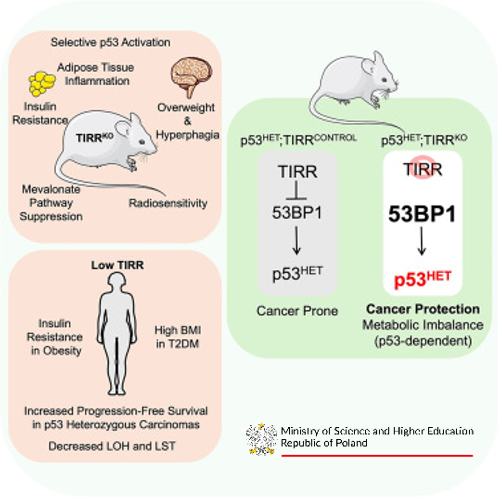We are excited to announce the publication of our latest paper in collaboration with Professor Dipanjan and Professor Hotamışlıgil labs in the Cell Reports journal (IF 8.8). Congratulations to Jędrzej Chrzanowski, MD, Dominika Michałek, MSc and prof. Wojciech Fendler on this achievement.
This study investigates the role of Tudor-interacting repair regulator (TIRR, NUDT16L1), as an inhibitor of p53 binding protein 1 (53BP-1)-medaited p53 activation. Our findings reveal that TIRR deficiency in mice leads to metabolic imbalances such as obesity and insulin resistance, while paradoxically recuding oncogenesis through enhanced tumor suppression activity. Through collaboration with Mateusz Kamiński, PhD, MD from the Department of General Surgery, Medical University of Lodz, we validated thos results in humans – the TIRR expression in adipose tissue correlates with higher BMI and insulin resistance in individuals undergoing bariatric surgery. Moreover, tissue-specific TIRR deficiency in mice allowed us to determine that the glucose homeostasis and hunger regulation were primarily regulated by TIRR expression in the adipose tissue and the CNS, respectively.
Furthermore, the analysis of TCGA data confirmed the TIRR loss’s oncoprotective effect across various human cancers, resulting in longer time to cancer progression. Both the TIRR’s oncoprotective and metabolic effects are dependent on p53, with the effect lost upon p53 deletion in TIRR-deficient mice.
The full publication is available in Open Access at: https://www.cell.com/cell-reports/fulltext/S2211-1247(24)00665-X
The project received financed from the Polish Ministry of Science and Higher Education’s Pearls of Science program, under grant no. PN/01/0025/2022, titled “Importance of the NUDT16L1-TP53BP1-TP53 axis in obesity and type 2 diabetes.”

